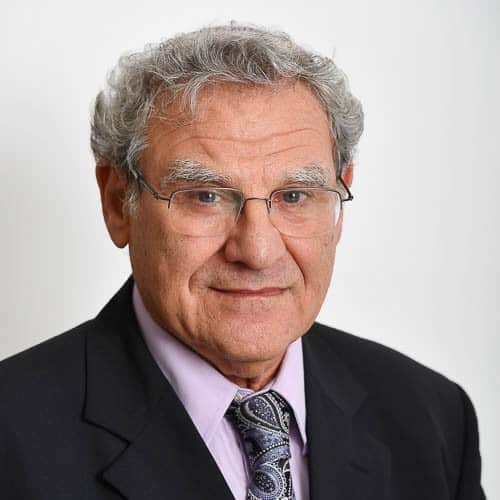Prof. Efraim Inbar: It would be a strategic nightmare if Turkey joins an axis with Russia, Iran and China. Only a Turkey linked to the West can refrain from going nuclear.

Ahval (UAE) 17.01.2021
By Robert Ellis
Critics like Middle East analyst Seth J. Frantzman may have slammed the current U.S. administration for pandering to Turkey and nodding to its regional expansion, but there is one foreign policy achievement Donald Trump chalked up in the final months of his presidency.
From August to January, a series of agreements known as the Abraham Accords were brokered by the White House to normalise relations between Israel and the United Arab Emirates, Bahrain, Morocco and Sudan. These involved various concessions and benefits, including U.S. recognition of Morocco’s sovereignty over the Western Sahara, strategic dialogue between the United States and the UAE and that Israel would suspend its annexation of parts of the West Bank.
In November, the Trump administration also informed Congress that it planned to sell 50 F-35 fighter jets to the UAE as part of a $23 billion arms deal. In turn, Turkey has criticised the UAE’s accord with Israel as “hypocritical”. But the Emirati foreign minister, Anwar Gargash, said that Turkey’s support for the Muslim Brotherhood was the main impediment to normal relations.
The Abraham Accords have not diminished strategic competition but moved it to a new dimension, the Defense & Foreign Affairs said in a special analysis. Israel’s security and position has been substantially reinforced and the United States has confirmed a commitment to the region, rather than fall back.
The foreign policy publication also stated it had “yet to consider Europe’s transformation and its impact on the greater Middle East. And that includes possible desperate acts by an increasingly bankrupt Turkey”.
However, Efraim Inbar, president of the Jerusalem Institute for Strategy and Security, said he did not consider the European Union, apart from French President Emmanuel Macron, as a strategic actor. As far as Turkey is concerned, it would be “a strategic nightmare” if Turkey joins an axis with Russia, Iran and China, he said. “Only a Turkey linked to the West can refrain from going nuclear.”
This, of course, begs the question: Which course of action should the West adopt?
Far from having any impact, the EU dithers and has decided to wait until its March summit before deciding whether to implement sanctions on Turkey. By which time, it hopes the new U.S. administration will have shown the way forward in handling relations with Turkey.
Turkish President Recep Tayyip Erdoğan has not been slow to utilise this indecision. Angela Merkel’s time as Germany’s chancellor is up, so in a video conference with European Commission president Ursula von der Leyen, Erdoğan repeated his mantra about turning a new page in EU-Turkish relations and dismissed the “caprices” of some member states and “the artificial problems” they had created.
He also reminded von der Leyen of the Turkey’s bottom line: an update of the customs union, visa liberalisation and a renewal of membership talks.
Already by August 2013 it became apparent that Turkey’s policy of ‘zero problems with neighbours’ had backfired, although Erdoğan’s then chief foreign policy adviser, Ibrahim Kalın, redefined Turkey’s isolation as “precious loneliness”. Now the cupboard is bare and the loneliness is not so precious any more.
As Trump’s Syria envoy James Jeffrey made clear in an Atlantic Council webinar, Qatar, Azerbaijan and Bulgaria do not add up to a sustainable regional alliance for Turkey.
The clear and present danger to Turkey from the Biden administration is the application of sanctions for the acquisition of the Russian S-400 missile system. Turkey has tried to gloss over the issue, claiming the United States has proposed a joint working group to consider the lifting of sanctions, but a U.S. spokesperson has dismissed the statement.
Nor does the reinstatement of the former U.S. Syria envoy Brett McGurk augur well for Turkey. Doubt has also been cast on Turkey’s attempt to establish normal relations with Israel. For example, the four-minute video, “The Red Apple”, released by the Presidential Directorate of Communications, makes clear Turkey’s intention to liberate the Al-Aqsa mosque in Jerusalem from Israel.
Russia and Turkey have confirmed their military cooperation in the face of U.S. sanctions, but nevertheless Foreign Minister Sergei Lavrov has denied that Russia has ever considered Turkey a strategic ally, albeit a very close partner. Despite Turkey’s support for Azerbaijan over Nagorno-Karabakh, Russia has now crowded Turkey out in the Caucasus.
According to Macron, “the rise of radical political Islam is undoubtedly the foremost enemy of European humanist values”, which the victims of terror in London, Manchester, Paris, Nice, Berlin and Vienna can only agree to. The events of 9/11 have left a permanent scar in the United States.
In the 21st century, the aim must be to prevent the advance of Islamist radicalism. U.S. President-elect Joe Biden has already committed to convene a global summit of democracies, but it is unlikely Turkey will be invited under Erdoğan’s government.
The Abraham Accords also seek to end radicalisation and conflict, so it would be appropriate for the United States to take the lead in this regard. Two position papers, one by the Jewish Institute for the National Security of America (JINSA) and the other by the Foundation for the Defense of Democracies (FDD), have outlined a strategy for a containment policy towards Turkey rather than accommodation, which will be necessary if the new enemy is to be defeated.






 - בניית אתרים
- בניית אתרים